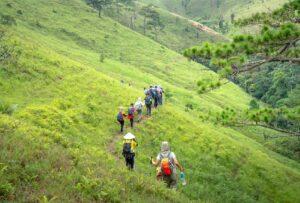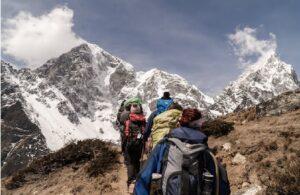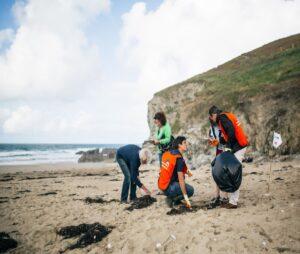
Introduction:
Ecotourism activities are special and distinct from normal activities because they are specifically designed to promote sustainable practices, conservation efforts, and the preservation of natural environments and cultural heritage.
Conventional tourism focuses solely on recreational pursuits without considering their impact on the environment and local communities. Ecotourism seeks to strike a harmonious balance between tourism and ecological responsibility. In this article, we will find 41 exciting ecotourism Activities that you need to know in 2024.
Why Ecotourism Activities
Here are some reasons why ecotourism activities are special:
Environmental Conservation:
Ecotourists aim to minimize the negative impact on fragile ecosystems and wildlife. Tour operators and travelers are encouraged to follow strict guidelines to protect the natural habitats they visit.
Support for Local Communities:
Ecotourism often involves partnerships with local communities, providing economic benefits, and empowering them to take an active role in conservation efforts. Local people are frequently involved in guiding, hosting, and managing eco-lodges.
Cultural Appreciation:
Ecotourism promotes cultural awareness and respect for indigenous communities and their traditional ways of life. Travelers have the opportunity to learn about local customs, arts, and traditions.
Education and Awareness:
Ecotourism emphasizes educational experiences, helping visitors understand the importance of preserving biodiversity and the need for sustainable practices.
Positive Feedback Loop:
Revenue generated through ecotourism is often reinvested in conservation projects, creating a positive feedback loop that benefits both the environment and local communities.
Unique Experiences:
Ecotourism offers travelers the chance to explore off-the-beaten-path destinations and encounter rare wildlife, providing unforgettable and authentic experiences.
In essence, ecotourism activities in 2024 go beyond mere leisure and seek to leave a positive impact on the environment and society.
I. Marine Adventures

- Glide through crystal-clear waters, surrounded by colorful coral reefs and vibrant marine life.
- Observe the stunning biodiversity of the underwater world without extensive diving equipment.
- Explore world-renowned snorkeling destinations like the Great Barrier Reef in Australia and the coral gardens of the Maldives.
- Experience a breathtaking glimpse into the wonders of the marine ecosystem.
2. Scuba Diving with Marine Life
- Immerse yourself in the underwater world with scuba diving adventures.
- Interact closely with marine creatures, such as sea turtles and playful dolphins.
- Discover hidden treasures in the depths of the ocean.
- Practice responsible diving to minimize disturbances to marine habitats.
3. Exploring Underwater Caves
- Embark on an exploration of mysterious underwater caves.
- Venture into the depths and witness unique geological formations.
- Experience the thrill of discovering hidden wonders below the surface.
- Ensure cave diving safety with experienced guides.
4. Swimming with Dolphins in Their Natural Habitat
- Engage in an ethical and awe-inspiring encounter with dolphins.
- Witness these intelligent marine mammals in their wild environment.
- Respectfully observe and interact with dolphins, promoting their well-being.
- Choose responsible tour operators that prioritize dolphin conservation.
II. Trekking Through Lush Tropical Territory

5. Hiking Untouched Trails in Tropical Rainforests
- Venture through lush tropical rainforests teeming with exotic flora and fauna.
- Experience the raw beauty of nature while raising awareness of deforestation and conservation efforts.
- Explore iconic rainforest destinations like the Amazon in South America and Borneo in Southeast Asia.
- Embrace sustainable trekking practices to preserve these delicate ecosystems.
6. Backpacking in National Parks and around to Observe Wildlife

- Immerse yourself in natural habitats by backpacking through hills.
- Witness diverse wildlife and learn about the delicate balance of ecosystems.
- Explore renowned national parks such as the Serengeti in Tanzania and Yellowstone in the United States.
- Support conservation efforts through responsible park visits.
7. Conquering Challenging Peaks for Breathtaking Views
- Summit challenging peaks for awe-inspiring vistas of pristine landscapes.
- Experience physical endurance and mental accomplishment while trekking.
- Conquer world-famous peaks like Mount Kilimanjaro in Tanzania and Mount Everest Base Camp in Nepal.
- Practice responsible mountaineering to preserve mountain environments.
8. Volcano Trekking Adventures in Geologically Rich Areas
- Embark on volcano trekking adventures to witness geological wonders.
- Hike to the summits of volcanoes with breathtaking vistas.
- Explore destinations like Mount Rinjani in Indonesia and Arenal Volcano in Costa Rica.
- Adhere to safety guidelines and respect volcanic environments.
III. Wildlife Encounters
9. Safari Tours in Natural Habitats

- Embark on safaris to witness wildlife in their natural habitats.
- Observe the “Big Five” and other fascinating species up close.
- Explore iconic safari destinations in Kenya, Tanzania, and South Africa.
- Promote responsible wildlife tourism to protect endangered species.
10. Night Safaris for Nocturnal Species
- Experience the magic of nocturnal wildlife during night safaris.
- Encounter elusive creatures like leopards, hyenas, and owls.
- Join guided night excursions in national parks and reserves.
- Use responsible safari practices to minimize disturbances.
11. Whale-Watching Expeditions to Witness Magnificent Creatures

- Join ethical whale-watching tours to witness majestic marine mammals.
- Observe humpback whales in Alaska or blue whales in Sri Lanka.
- Learn about whale conservation efforts and responsible tourism.
- Respect marine wildlife and their natural behaviors.
12. Tracking Endangered Species with Expert Guides
- Engage in wildlife tracking expeditions to locate endangered species.
- Witness orangutans in Borneo or mountain gorillas in Rwanda.
- Gain insights into conservation challenges and successes.
- Support sustainable ecotourism to protect endangered species.
IV. Bird Watching: An Enchanting Ecotourism Activity
Bird watching offers a captivating ecotourism activity for nature enthusiasts. As birders explore diverse destinations worldwide, they contribute to conservation efforts, climate change studies, and environmental awareness. Embrace the allure of bird watching, a rewarding journey into the beauty and significance of avian life.

13. The Thrill of Discovery:
- Bird watching offers excitement and discovery as enthusiasts spot diverse bird species with unique colors and behaviors.
- Observing rare or elusive birds can be particularly thrilling for birders.
14. Appreciation of Biodiversity:
- Birds contribute to biodiversity and ecological balance in ecosystems.
- Bird watching fosters a deeper appreciation for the interconnectedness of all living beings.
15. Meditative Experience:
- Bird watching in natural settings can be meditative and calming.
- The tranquility and focused observation of birds promote mindfulness and reduce stress.
V. Aquatic Marvels
16. Kayaking Through Pristine Rivers and Mangroves
- Navigate tranquil rivers and mangrove forests on kayaking adventures.
- Observe wildlife up close and appreciate serene nature surroundings.
- Choose eco-friendly kayaking practices to preserve water ecosystems.
- Enjoy kayaking experiences in diverse destinations worldwide.
17. Rafting in Wild Rapids for Thrilling Water Adventures
- Experience adrenaline-pumping white-water rafting in wild rapids.
- Conquer rivers like the Colorado River in the Grand Canyon or the Zambezi River in Zambia.
- Admire the power of water and the beauty of river landscapes.
- Practice responsible rafting to protect river ecosystems.
18. Paddleboarding on Calm Waters for Serene Nature Observations
- Connect with nature on paddleboarding excursions.
- Explore the calm waters of lakes, mangrove lagoons, or fjords.
- Observe wildlife and immerse yourself in natural beauty.
- Embrace eco-friendly paddleboarding practices.
19. Canoeing in Remote Lakes Surrounded by Scenic Beauty
- Escape to remote lakes and embrace pristine scenery.
- Enjoy tranquility and solitude while canoeing.
- Experience destinations like the Canadian Rockies or the Swedish archipelago.
- Follow leave-no-trace principles to preserve lake environments.
VI. Immersive Forest Experiences
20. Walking on Canopy Walkways to Observe Life in the Treetops
- Access treetop wonders on canopy walkways.
- Spot rare bird species and elusive creatures in the upper layers of the forest.
- Experience thrilling perspectives of the forest canopy.
- Choose ecologically sustainable canopy walks for minimal impact.
21. Camping in Ancient Forests for a Deep Connection with Nature

- Immerse yourself in ancient forests by camping amidst towering trees.
- Experience biodiversity and observe wildlife in their natural habitat.
- Embrace eco-friendly camping practices and leave a minimal footprint.
- Connect with nature on a profound level.
22. Forest Bathing for Mindful Relaxation and Stress Relief
- Practice Shinrin-yoku, the Japanese art of forest bathing.
- Immerse yourself in the forest atmosphere for mental and physical well-being.
- Reduce stress, improve mood, and boost the immune system.
- Let nature’s healing powers rejuvenate your spirit.
23. Guided Nature Walks to Learn About Flora and Fauna

- Join expert naturalists on educational nature walks.
- Learn about the intricate relationships between flora and fauna.
- Appreciate the importance of biodiversity and ecosystem services.
- Gain insights into the conservation challenges our planet faces.
VI. Cultural Immersion
24. Visiting Indigenous Communities to Learn About Their Traditions
- Engage in cultural exchanges with indigenous communities.
- Gain insights into their traditional knowledge and ways of life.
- Foster cultural understanding and appreciation.
- Respect the customs and traditions of indigenous people.
25. Participating in Local Crafts and Artwork Workshops
- Support local artisans and crafters by participating in workshops.
- Learn traditional crafts like pottery-making or textile weaving.
- Contribute to sustainable livelihoods in local communities.
- Celebrate the cultural heritage of art and craftsmanship.
26. Attending Traditional Dance and Music Performances
- Immerse yourself in the cultural heritage of a destination.
- Attend traditional dance and music performances.
- Experience rhythmic African drumming or graceful Balinese dances.
- Celebrate the richness of human expression through art.
27. Culinary Experiences With Local Produce and Indigenous Cuisine
- Explore a region’s culinary traditions through local produce.
- Indulge in indigenous cuisine and traditional dishes.
- Participate in cooking classes to learn regional recipes.
- Support sustainable food practices and embrace local flavors.
VII. Conservation Volunteering
28. Contributing to Marine Conservation Projects

- Join marine conservation projects to protect coastal ecosystems.
- Assist in coral reef restoration and marine life monitoring.
- Contribute to beach clean-ups to combat marine debris.
- Play an active role in preserving ocean biodiversity.
29. Assisting at Wildlife Rehabilitation Centers
- Volunteer at wildlife rehabilitation centers to care for injured animals.
- Support the conservation efforts of vulnerable species.
- Assist in the rehabilitation and release process.
- Contribute to wildlife welfare and recovery efforts.
30. Joining Tree Planting and Reforestation Initiatives
- Participate in tree planting and reforestation projects.
- Combat deforestation and restore degraded habitats.
- Foster carbon sequestration and enhance biodiversity.
- Contribute to global efforts to combat climate change.
31. Participating in Beach Clean-up and Environmental Awareness Programs
- Take part in beach clean-up drives to combat marine pollution.
- Engage in environmental awareness programs with local communities.
- Educate others about sustainable practices and eco-friendly habits.
- Advocate for responsible tourism and conservation initiatives.
VIII. Volunteering and Community-based Tourism: Making a Difference
32. Contributing to Conservation Efforts
- Volunteering and community-based tourism contribute to conservation efforts.
- Wildlife conservation programs protect endangered species and monitor populations.
- Habitat restoration projects improve ecosystems and create better habitats for wildlife.
- Anti-poaching initiatives combat illegal wildlife trade and protect endangered species.
33. Empowering Local Communities through Tourism
- Community-based tourism empowers local communities economically and socially.
- It generates income through homestays, locally guided tours, and local products.
- Travelers gain insight into local customs and help preserve cultural heritage.
- Community-based tourism focuses on sustainable development and responsible practices.
34. Engaging in Ethical Volunteer Programs
- Ethical volunteer programs prioritize responsible and sustainable practices.
- Volunteers contribute their skills to align with community needs and conservation goals.
- Ethical volunteering aims for long-term impact and sustainable outcomes.
- Volunteers show cultural sensitivity and foster exchange without imposing external values.
XIII. Sustainable Farm Visits: Learning About Eco-friendly Agriculture
35. Experiencing Sustainable Farming Practices
- Sustainable farm visits offer insight into eco-friendly agriculture and environmental preservation.
- Organic farming techniques avoid synthetic pesticides and promote soil health and biodiversity.
- Crop rotation and regenerative agriculture practices improve soil fertility and carbon sequestration.
- Travelers learn about water-saving techniques such as drip irrigation and rainwater harvesting.
36. Supporting Organic Farming and Biodiversity

- Sustainable farm visits contribute to biodiversity preservation and support local farmers.
- Organic farms serve as havens for native flora and fauna, promoting biodiversity.
- Travelers’ support of sustainable farms reduces the carbon footprint of food transportation.
- Purchasing products directly from farms provides economic support to local farmers.
37. Promoting Responsible Food Tourism
- Sustainable farm visits educate travelers about the environmental impact of food production.
- Responsible food tourism encourages conscious and informed food choices.
- Visitors learn about efforts to minimize food waste on sustainable farms.
- Engaging with local farmers supports the socioeconomic well-being of communities.
VIII. Eco-Lodges and Green Stays
38. Staying in Eco-Friendly Accommodations with Sustainable Practices

- Choose eco-lodges that prioritize environmental sustainability.
- Stay in accommodations that utilize renewable energy sources.
- Embrace responsible waste management practices.
- Support eco-friendly businesses committed to reducing their carbon footprint.
39. Glamping in Nature for Luxurious Yet Responsible Travel

- Indulge in the comforts of luxury while connecting with nature.
- Experience glamping in lavish tents amidst stunning landscapes.
- Appreciate the beauty of the outdoors without sacrificing comfort.
- Opt for eco-friendly glamping options that align with sustainable practices.
40. Experiencing Off-Grid Eco-Resorts Powered by Renewable Energy
- Escape to off-grid eco-resorts that rely on renewable energy.
- Experience sustainable living in harmony with nature.
- Embrace eco-resorts with minimal environmental impact.
- Enjoy eco-friendly amenities and eco-conscious activities.
41. Engaging in Low-impact Camping and Leave-No-Trace Principles
- Practice low-impact camping to minimize environmental impact.
- Follow leave-no-trace principles to preserve natural landscapes.
- Respect nature and wildlife during camping experiences.
- Leave behind only footprints and memories of your eco-adventures.
Conclusion
Major take-away from the above-mentioned 41 exciting ecotourism Activities in 2024.
- Embrace ecotourism activities as a way to connect with nature responsibly.
- Create unforgettable memories while contributing to conservation efforts.
- Support local communities and promote sustainable livelihoods.
- Let your ecotourism bucket list inspire a love for our planet and a commitment to preserving its wonders for future generations.








